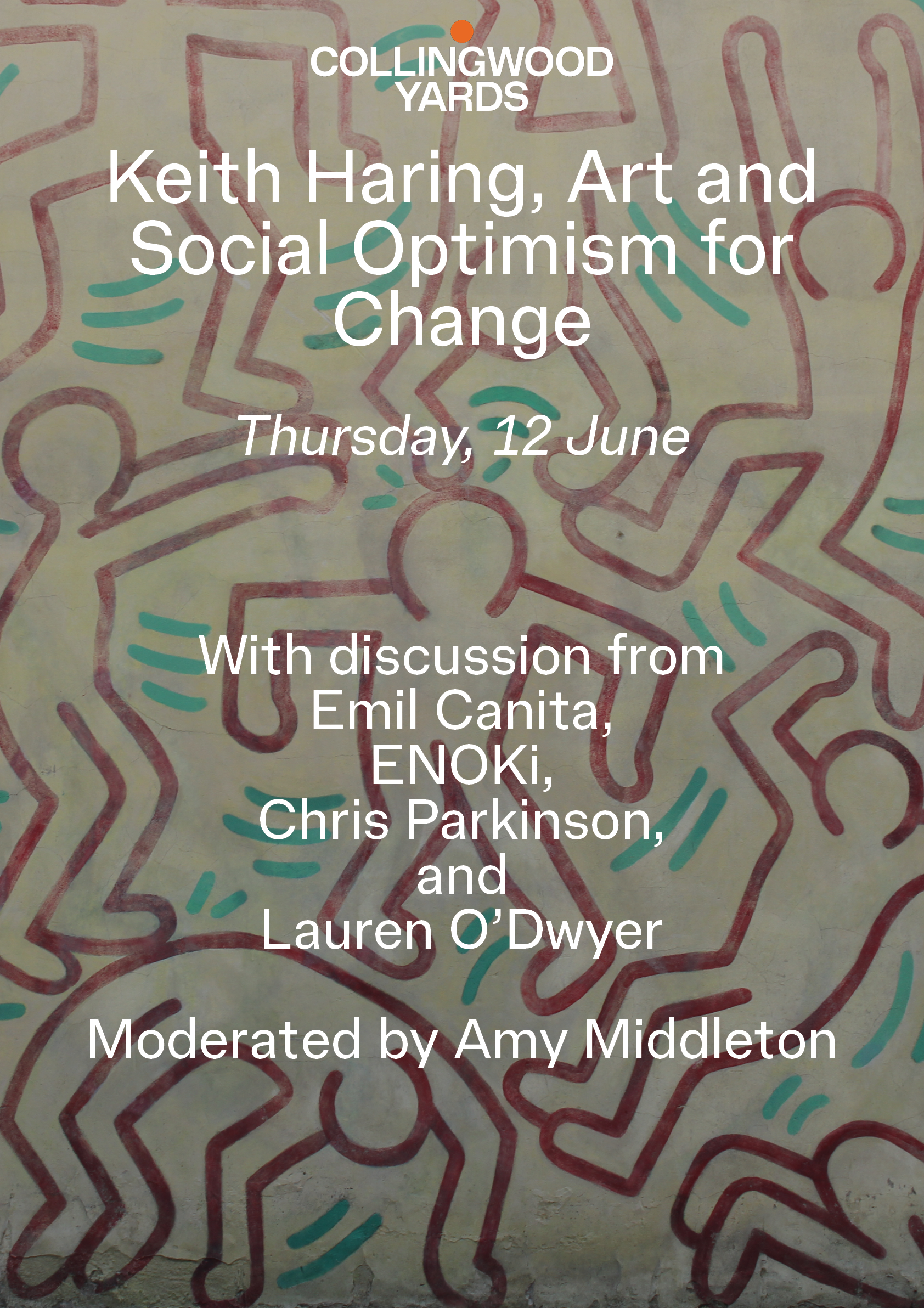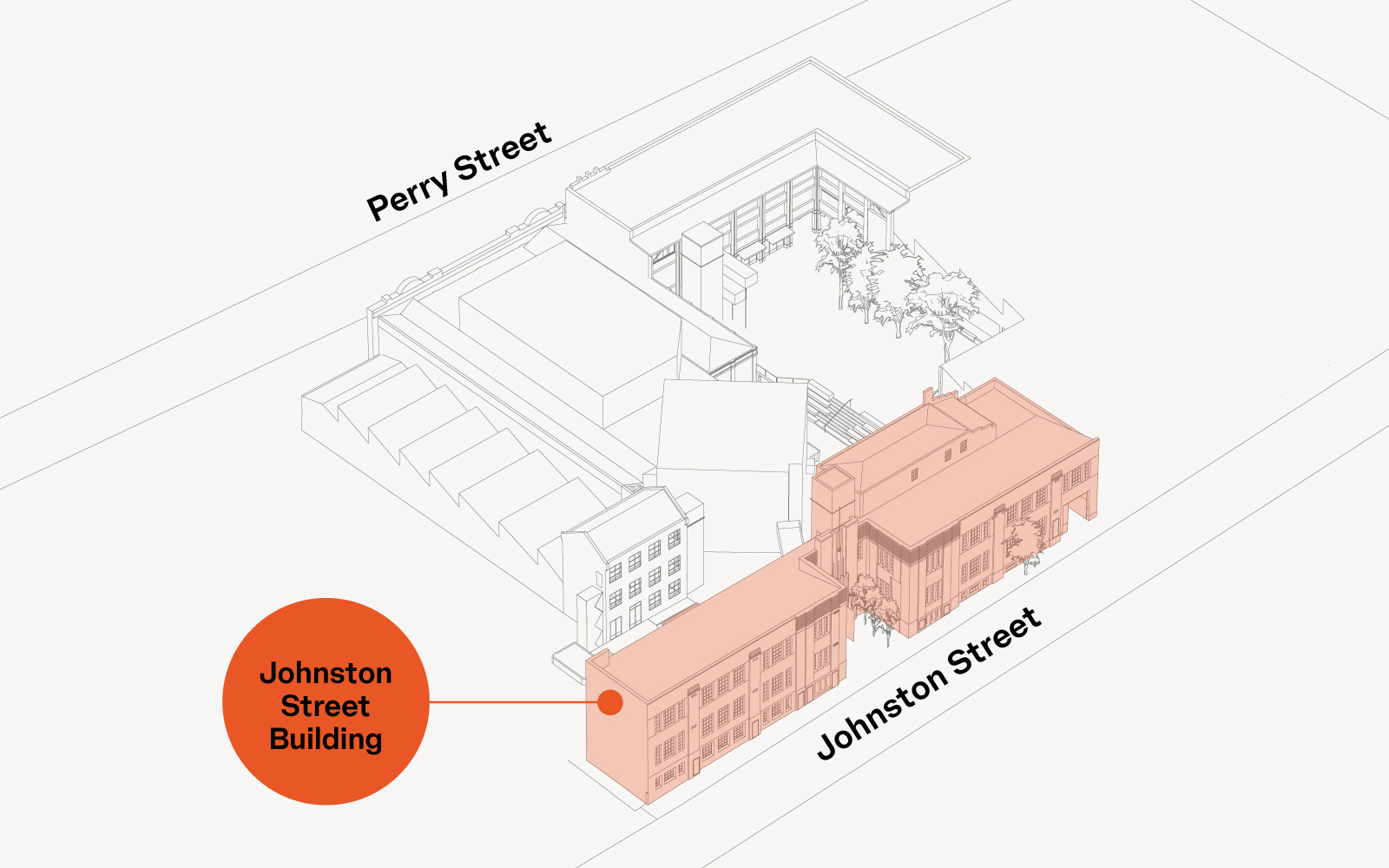Collingwood Yards
Optimism in Activism – Keith Haring, Art and Social Optimism for Change

Forty-one years ago, Keith Haring painted a mural on the side of a school building in Johnston St, Collingwood. That school building is now Collingwood Yards, and Haring’s mural has since become a stirring and lively homage to his legacy of art, activism and influence.
Join us for a panel discussion that will explore art and social optimism as it pertains to Haring’s ongoing legacy and spirit. What can we learn from Haring’s ability to spark public conversation, and how is artistic expression still being utilised today to enact social change? Where do public art and activism intersect, and how can we wield their overlapping power?
With Emil Canita, Darcy Enoki McConnell, Chris Parkinson, and Lauren O’Dwyer, moderated by Amy Middleton followed by a performance from The Huxleys
Emil Canita
Emil Canita (he/she/they) is a trans Filipino artist. Emil’s distinctive art practice involves the use of glory holes as a a creative medium. Within these intimate spaces, they document encounters with their subjects, capturing the rawness and vulnerability that can often be found in moments of sexual connection. Through video recordings, storytelling, and Polaroid snapshots, Emil invites viewers into a world that is often hidden or misunderstood, challenging preconceived notions and allowing for deeper engagement with their art. By sharing these intimate narratives, Emil confronts societal taboos, dismantles stereotypes, and encourages viewers to question their own perceptions of identity and desire. As Emil’s artistic journey continues to evolve, they remain a vital force in redefining the boundaries of art, sex work, and personal expression.
ENOKi
ENOKi (they/them) is a proud Dja Dja Wurrung and Yorta Yorta Blak Fulla based on Wurundjeri Country. They are a multi-media artist with a focus on digital media. ENOKi’s previous work includes the First Peoples’ RISING art tram My Aunty Once Told Me, and Apple’s 2023 World Pride Campaign. They also contributed to Solid Lines, a Royal Melbourne Institute of Technology (2022) sponsored report on fostering First Nations access, participation and representation in the design and commercial art industries in Australia.
“I explore the themes of Blakness and Queer Identity in my practice and I am heavily inspired by the ‘80s, ‘90s, and early 2000s artists, rap hip-hop, and pop culture. Keith Haring and Basquiat are the biggest inspirations in my work.” – ENOKi
Chris Parkinson
Chris Parkinson is an artist and researcher engaged with lens-based, urban, and conceptual practices. Working primarily through photographic processes and practice, Chris Parkinson remixes urban surfaces in compositions indebted to seriality and abstraction, rhythm and affect, text and subtext.
Parkinson’s collaborative practices have been shaped through art collectivism and sustain a strong connection to the Southeast Asia region. His 2010 book, Peace of the Wall: Street Art from East Timor, is described as a “book of evocative photojournalism capturing an important moment in East Timor’s history through its walls.”
In research, he has written and presented on graffiti and conflict, art collectivism and surface studies. His current PhD research at the University of Melbourne presents a Rhythmanalysis of the Indonesian art Collective, Survive! Garage, exploring collective art practices and public cultures in Yogyakarta, Indonesia.
As an educator, Parkinson, coordinates and delivers a Street Art elective to undergraduate students at the University of Melbourne and is a Youth Arts Officer with the inner-city Melbourne municipality City of Yarra.
This panel will be moderated by Amy Middleton, Archer Magazine
Venue
Upper Ground Floor,
35 Johnston Street
Collingwood Yards
Collingwood 3o66

Accessibility
Wheelchair ramp etc.